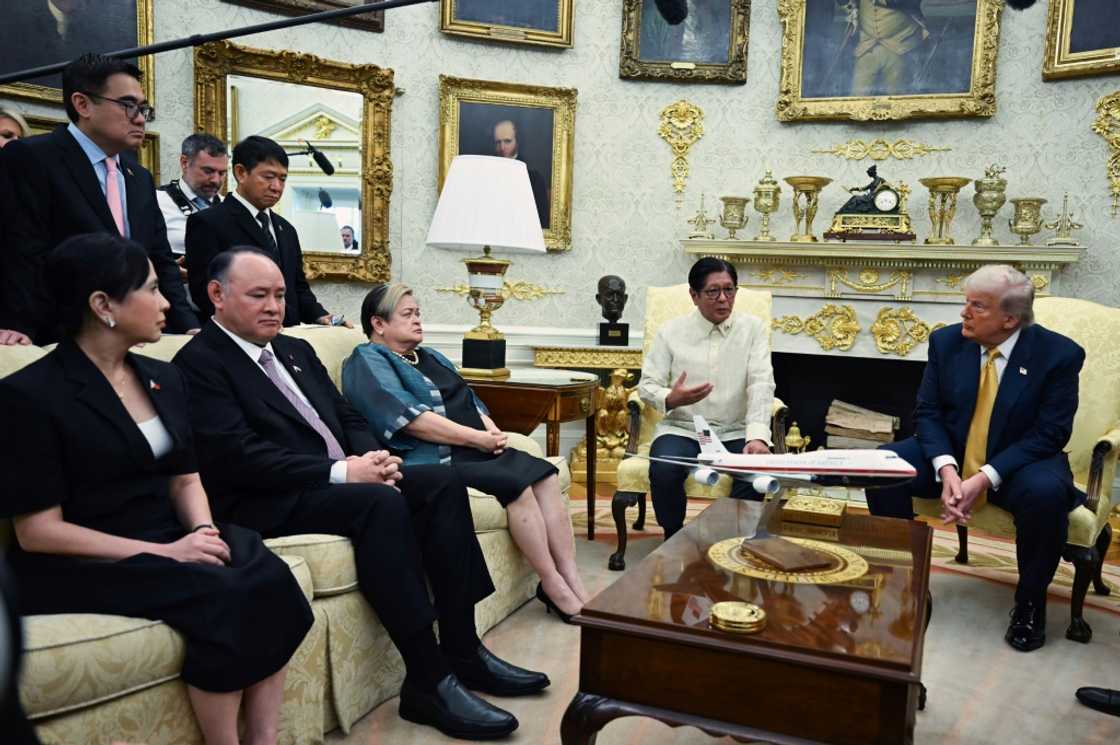Trump agrees to small reduction in Philippine tariffs

Source: AFP
US President Donald Trump agreed Tuesday to reduce threatened tariffs on the Philippines, but only by one percentage point, after what he termed a successful meeting with his counterpart Ferdinand Marcos.
Welcoming Marcos to the White House, Trump called him a "very tough negotiator" and said: "We're very close to finishing a trade deal -- a big trade deal, actually."
In a social media post shortly afterward, Trump said that while the Philippines would open up completely to US goods, he would still impose a 19 percent tariff on products from the Southeast Asian country, a major exporter of high-tech items and apparel.
"It was a beautiful visit, and we concluded our Trade Deal, whereby The Philippines is going OPEN MARKET with the United States, and ZERO Tariffs," Trump wrote on his Truth Social platform.
The Philippines was among two dozen economies confronted by Trump with letters this month warning of 20 percent tariffs on all goods coming into the United States as of August 1.
The 19 percent rate is still above the 17 percent threatened by Trump in April, when he threatened sweeping global tariffs.
The trade rift comes despite increasingly close defense relations between the United States and the Philippines, a former US colony and treaty-bound ally that has seen high tensions with China.
The United States last year, under Trump's predecessor Joe Biden, deployed ground-launched missiles in the Philippines.
Washington has also eyed ammunition manufacturing in the Philippines, despite the closure in 1992 of the US naval base at Subic Bay due to heavy public pressure.
"All of what we consider part of the modernization of the Philippine military is really a response to the circumstances that surround the situation in the South China Sea," Marcos said next to Trump.
Trump devoted much of the appearance to attacks on his Democratic predecessors Biden and Barack Obama.
"We are essentially concerned with the defense of our territory and the exercise of our sovereign rights," said Marcos.
"Our strongest, closest, most reliable ally has always been the United States."
Trump eyes China visit
China and the Philippines have engaged in a series of confrontations in the contested waters of the South China Sea, which Beijing claims almost entirely, despite an international ruling that the assertion has no legal basis.
Trump has frequently questioned allies over their military spending, pondering why the United States should defend them in the NATO alliance.
He has voiced fewer doubts about the Philippines. Both Defense Secretary Pete Hegseth and Secretary of State Marco Rubio in meetings with Marcos on Monday vowed to honor the 1951 Mutual Defense Treaty with the Southeast Asian nation.
The Trump administration has identified China as the top US adversary but the US president has also boasted of his relationship with Chinese counterpart Xi Jinping.
Speaking alongside Marcos, Trump said he would "probably" visit China at Xi's invitation "in the not-too-distant future."
He said of Marcos: "I don't mind if he gets along with China very well, because we're getting along with China very well."
Trump added the Philippines had been "maybe tilting toward China" and "we untilted it very, very quickly."
"I just don't think that would have been good for you," Trump said.
The US president credited himself with the shift, although the turn towards Washington began after the 2022 election of Marcos, before Trump returned to power.
Marcos's predecessor Rodrigo Duterte had flirted with closer relations with China and bristled at US criticism over human rights under Biden and Obama.
Duterte is facing charges of crimes against humanity at the International Criminal Court over a sweeping campaign against drug users and dealers that rights groups say killed thousands.
Source: AFP





